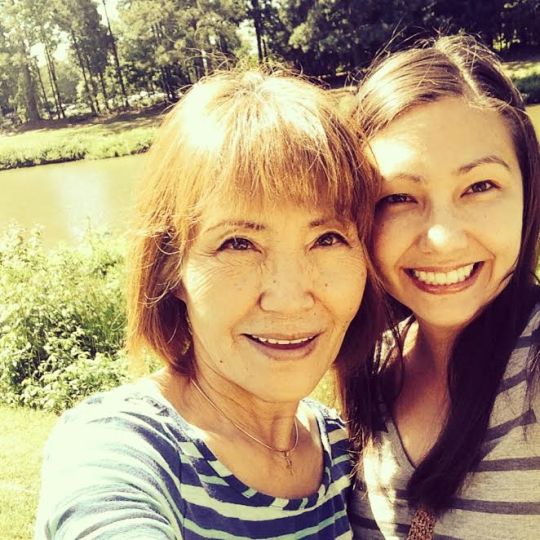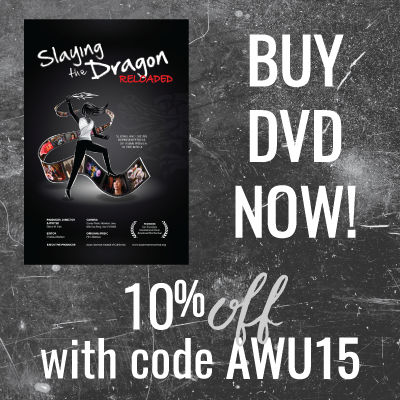By Trish Broome
This story originally appeared in Mixed Nation on July 30, 2014.

The most recent picture with the author and her mother.
Every time that I get the urge to buy something, I think about the wise words that my mother told me years ago when I went off to college: “Credit cards are bad. Never use one unless it’s for an emergency.” At the time I thought that she was being a typical frugal Korean, but now that I’m older and have a mortgage and bills, I am grateful that she gave me the advice. I literally have one credit card that is fully paid off, and I refuse to use it unless I’m in dire need.
I didn’t always appreciate the advice that my mother gave me when I was growing up. I was in middle school – at the peak of my anti-adult phase – when she and my father divorced in 1992. I didn’t want to be told what to do and how to live. I refused to believe that my father had abandoned us. But he had, and he had left an immigrant woman with only a high school education to raise two kids on her own. She worked tirelessly making computer and video parts during the week, and spent the weekends selling fake jewelry and hair accessories at the fleamarket.
I blamed my mother for the divorce because she was the only one I could blame. I actually blamed her for many things. I was angry that I couldn’t ask her for help on homework because she didn’t understand the material. I was upset that she never came to any of my softball games because she was always working too late. I despised spending weekends with her at the fleamarket. And although I loved eating rice and kimchi at least five times a week, I wished that she would make more American meals and learn how to bake cookies, but she didn’t. She just always seemed so tired.
When I left for college, I wished that she would send me care packages or letters, but it never happened. Even on the phone I had to be the one to say “I love you” first because she was never a physically or vocally affectionate person. I never understood anything about her until after I graduated college and got my first job and apartment. I finally understood the value of her years of hard work, and why she had to have two or three jobs just to pay the bills. I understood what it was like to come home after a hard day of work and not have the energy to cook a full meal or bake a batch of cookies. Most importantly, I understood that my mother had done her absolute best raising her children alone for so many years.
When I visited her in Virginia several years ago, she helped me to fully understand who she was. She had stood in line for rice rations during the Korean War and was left an orphan when both of her parents died. She had dreams of being an actress in the theater, but then she met my American father during the Vietnam War and moved to his hometown of Oklahoma, where she experienced racism from locals. She raised my brother and me alone for months on end while my father traveled abroad for the army. When my father was around she had to deal with his alcoholism, and that lasted over 20 years until they finally divorced.
Hearing her story in its entirety made me feel lucky to be my mother’s daughter, and grateful that she trusted me enough to open up and show a side of vulnerability. The woman I had never seen cry as a child finally did, and we cried together. It was a bonding experience that I will never forget.
Today, I would not be ashamed to tell my now 2-year-old daughter that her Korean grandmother used to work at a dry cleaners, because my mother taught me the value of hard work, and I’m going to carry on that tradition. I’m proud to say that I have no credit card debt when I hear others talk about filing for bankruptcy or owing thousands of dollars. I’m glad that I buy things on sale or from a clearance rack because that’s what my mom did with me, and I don’t need to spend a lot of money to be happy. The only thing I’m still a bit upset about is that I never learned how to bake, but luckily I have a husband who does that for me!
I thank my mother for being an inspirational example for all immigrants who come to this country alone, and for being a strong mother and independent woman.
